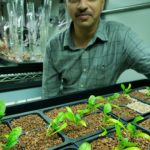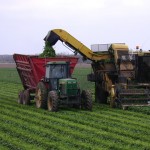Writer: Paul Schattenberg, 210-859-5752, paschattenberg@ag.tamu.edu
Contacts: Dr. Vijay Joshi, 830-278-9151, Vijay.Joshi@tamu.edu
Dr. Daniel Leskovar, 830-278-9151, Daniel.Leskovar@ag.tamu.edu
UVALDE – Texas A&M AgriLife research will collaborate with the Texas Department of Agriculture and the University of California at Davis on a project to help agricultural producers and consumers through improving nitrogen use efficiency and food safety in spinach.
The entities were recently awarded a $743,878 grant from the U.S. Department of Agriculture for this project, which will be led by Dr. Vijay Joshi, AgriLife Research plant physiologist at the Texas A&M AgriLife Research and Extension Center in Uvalde. The U.S. Department of Agriculture announced $7 million in finding to support 11 projects in six states to develop solutions to challenges affecting specialty crop industries that cross state boundaries.
Principal partners on the project include Drs. Allen Van Deynze, E. Charles Brummer and Juliana Osorio-Marin, all from the University of California-Davis; Dr. Daniel Leskovar, the Agrilife center in Uvalde; Dr. Carlos Avila, Texas A&M AgriLife Research and Extension Center, Weslaco; and Drs. Matthew Taylor and Alejandro Castillo, both from Texas A&M University, College Station.
The USDA awards are managed through the Specialty Crop Multi-State Program and are administered by the Agricultural Marketing Service. According to the USDA, these awards help stakeholders work together and provide the ability to leverage state and private sector resources across state lines, especially tapping the knowledge and experience of farmers and other in the agricultural industry.
Joshi said one of the main objectives of the project will be to evaluate nitrogen use efficiency of spinach accessions using metabolic traits associated with nitrogen uptake-assimilation and root architecture. He said other goals include identifying superior alleles for traits associated with nitrogen use for introducing into spinach varieties, as well as evaluating spinach germplasm for anti-microbial activities.
“Findings from our proposed research project will help in developing spinach varieties with enhanced nitrogen use efficiency by using cutting-edge tools in genomics and metabolomics,” Joshi said. “During implementation of the project, we also will be cognizant of reducing environmental damage while improving productivity under different systems of farming.
“Vegetables like spinach are often over–fertilized with nitrogen to get better yields or improve certain quality traits. But high levels of nitrogen can also cause environmental problems, such as excessive nitrogen leaching into the groundwater.”
“And because spinach has poor nitrogen uptake due to a shallow root system and short production cycle, we need to improve its genetics in a way that will also improve its nitrogen utilization,” Joshi said. “By teaming up with experts from UC-Davis, our project research will use whole-genome resequencing and genome-wide association analysis to identify superior plant traits and mechanisms associated with effective nitrogen uptake so we can optimize the nitrogen use in spinach.”
He said the nutrient status of spinach, as with other vegetable plants, is expected to play a significant role in the metabolic activity and colonization by potential foodborne pathogens.
“Foodborne pathogens are a serious producer and consumer concern for fresh and processed spinach, and we hope through our research to identify new sources of inhibitors to control these pathogens,” Joshi said.
“This research grant fits centrally to the core mission of our Uvalde center, which is to create knowledge and technology that result in efficient and profitable intensive agricultural management systems while maintaining balance between the environment and social prosperity,” said Leskovar, center director and AgriLife Research plant physiologist. “Through cutting-edge technologies, the research team will accelerate the development of new healthy and safe spinach varieties with improved nitrogen use efficiency. This will benefit not only those using conventional farming but also existing or in transition organic growers.”
Leskovar said the reduction of environmental degradation by nitrate leaching into groundwater resources is a critical issue for spinach-producing areas such as the Texas Wintergarden area and the Salinas Valley of California.
“This research will also be focused on helping reduce the amount of non-beneficial nitrogen that may find its way into the water table, he said. “It will also be focused on identifying spinach genotypes and developing varieties with enhanced natural defensive antimicrobial compounds that will reduce or possibly even control the risk of pathogen outbreaks for consumers.”
-30-
Related
Source: Texas A&M AgriLife Research to lead project to enhance spinach production, safety | AgriLife Today


